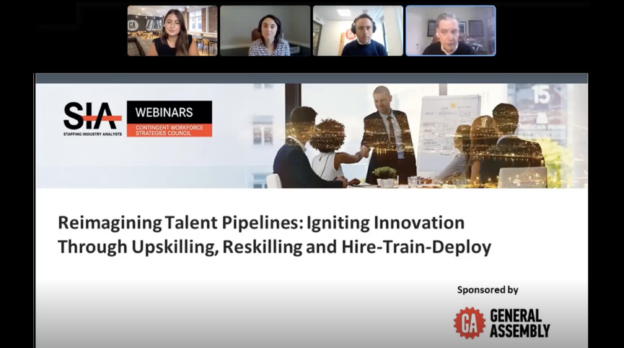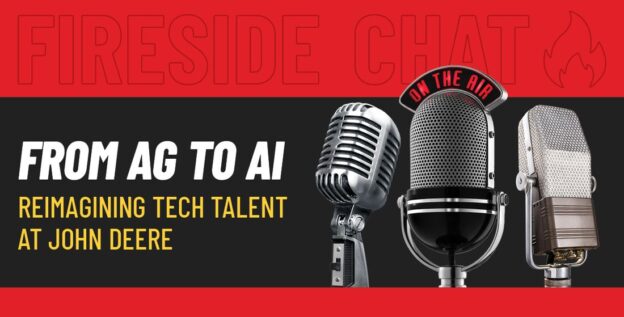
AI is rapidly changing how people think and work — which means organizations need top talent in AI-focused roles to compete. But AI is a burgeoning technology — not only are organizations’ existing workforces not equipped with necessary AI skills, but these skills are typically not available via traditional education systems.
Recently, General Assembly and Staffing Industry Analysts (SIA) presented a webinar titled, “Reimagining Talent Pipelines: Igniting Innovation through Upskilling, Reskilling, and Hire-Train-Deploy,” exploring ways to upskill for AI and hire more diverse, job-ready talent using innovative talent pipeline strategies. Read on for key AI skills gap insights from this expert panel:
- Daniele Grassi, Chief Executive Officer, General Assembly
- Cari Perez, Senior Account Director, General Assembly
- Amy Horvat, Research Analyst, SIA
- Stephen Clancy, Senior Director, CWS Knowledge and Research, SIA
Inside the state of AI skills gaps
Today, fewer than one skilled employee is available per open role.
The biggest culprit? The rise of AI tools is impacting talents’ skills availability and fluency. Think about it. Why, for example, would a programmer bother learning to code a particular sorting algorithm when a well-written ChatGPT query can accurately produce that code in a fraction of the time?
“Well-written” is the key word here — mastering AI to maximize productivity is a skill in and of itself. But 70% of leaders say it’s more challenging to find new AI-skilled talent than talent for previous hard-to-fill roles.
Upskilling for AI
Your organizations’ health and competitiveness will depend on its ability to address this AI labor shortage. That’s where AI upskilling comes in:
- Establish a clear upskilling strategy. You can only fill organizational skill gaps when you know what you’re trying to accomplish with upskilling.
- Keep talent at the center of everything AI upskilling. Employees will only feel invested in learning new AI skills to help your organization succeed if they’re excited, engaged, and can understand why upskilling for AI is beneficial.
- Prioritize skills over experience. Credentials and time spent in a role don’t inherently translate to skills — and with AI at an early stage, you won’t find talent with years of AI experience. Give less experienced talent the AI skills they’ll need to best deliver your organization innovation and success.
Benefits and outcomes
Reliable, AI talent pipelines tailored to your organization’s needs and goals can:
- Reduce employee turnover and create more sustainable teams
- Minimize costs by eliminating the need to pay premiums for consultants, experience, or training
- Make existing costs more predictable and budget-friendly
- See fast, efficient scalability for filling short-term needs and long-term growth strategies
- Improve quality of workers placed in new roles both short and long term
Need proof? Look to General Assembly’s AI talent pipeline outcomes:
- 91% of GA talent were retained for an average of two-plus years, while 81% stayed over three years.
- GA’s internal reskilling bootcamps take just three months compared to two- and four-year degree programs, while our upskilling short courses take only 10 weeks.
- 60% of GA graduates are ethnically diverse, and 67% were between ages 25 and 34.
- It takes one month to onboard GA bootcamp graduates compared to three months on average for most other hire-train-deploy vendors.
How to build better AI talent pipelines
The panel recommended three questions businesses should answer at an early stage to shape your organization’s talent pipeline approach:
1. What’s your pipeline’s goal?
Your talent pipeline’s goal(s) should frame your approach. Common goals include:
- Accessing new and diverse talent
- Onboarding new talent faster
- Training existing employees with relevant skills
2. Does your pipeline align with clear outcomes?
General Assembly recommends incorporating a learning solution that:
- Aligns practice with real-world skills
- Offers hands-on learning opportunities
- Builds “t-shaped” employees — people with deep, specialized knowledge and skills
3. Does your pipeline incorporate a learning partner with an excellent track record?
The right learning partner should be known for:
- Providing instructors with real-world experience
- Producing students pleased with their learning outcomes
- Offering clients willing and eager to speak on the program’s behalf
Once you’ve answered these questions, start building your pipeline. Be sure to:
- Build alternative pathways like tech hire-train-deploy models and apprenticeships that expand your talent pool and prepare talent for in-demand roles.
- Prepare for future skills now by pinpointing headcounts, roles, and skill profiles needed to prepare your company for success in an AI-driven economy.
- Encourage talent leaders to pursue nontraditional hiring processes — like removing degree requirements and partnering with community organizations and training partners — to hire the right AI talent for the job.
Don’t wait — AI is here to stay
Ready your organization for the AI talent pipeline revolution today with even more need-to-know AI upskilling insights from General Assembly and SIA’s joint webinar. Download the webinar presentation slides here. And explore our portfolio of AI training solutions here.








